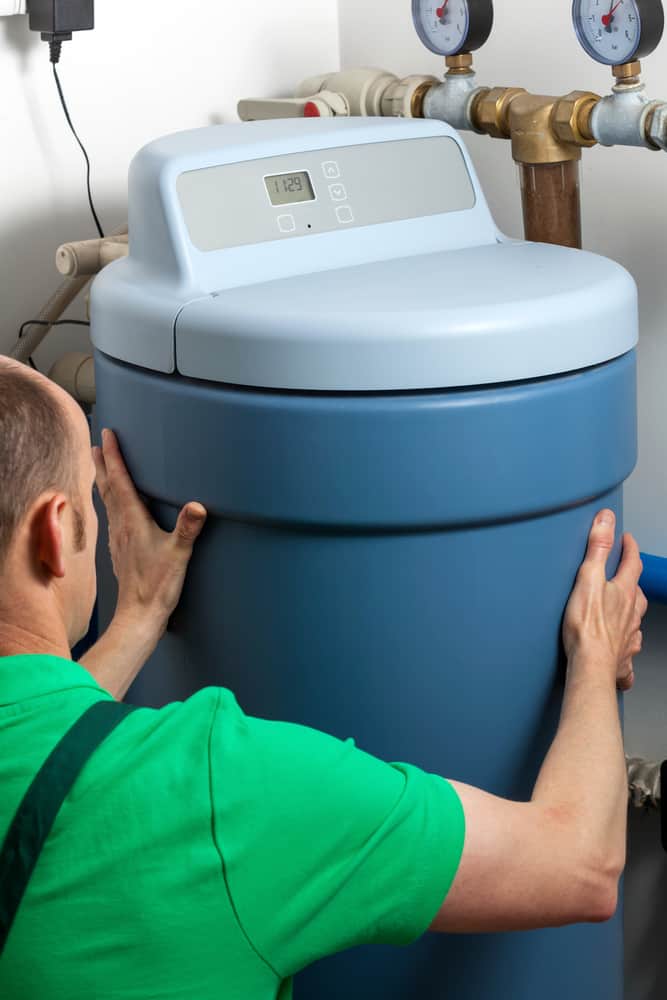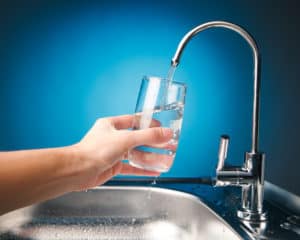We like to share product recommendations with you and hope you like them! Just to make you aware Water Filter Data may collect a small share of sales or other compensation from the links on this page.
Whether you are using wells or you get your water from municipal sources, chances are you will encounter the problem of “hard water”. What does this mean? I first learned about hard water when I started noticing white spots on dishes that were already washed. Also, a couple of home appliances that run on the water started breaking down often. So I did a little research and found what the problem is and how to solve it. When dealing with hard water, you have two options – water softener or water conditioner. You’ve already decided on the water softener as the right choice for you, but you still have some questions about the way it functions, or how much water does a water softener use.
How Does A Water Softener Work?

In order to use it correctly, you need to understand what a water softener is and how it works.
When you run water through the water softener, it actually flows from the home water pipe into the system, passing through a resin tank. As it passes through the tank, the minerals that are responsible for hardening the water dissolve into it, and in their place, the resin releases sodium ions. Soft water then continues to flow back from the water system into the house pipes.
Because water softeners use salt in the process of softening, you might think that your water can end up tasting salty. Don’t worry, that is not the case. Although salt is used, after the harmful minerals are removed from the water, the salt gets removed too.
Another thing you need to understand is that a water softener does not purify the water. Yes, it does remove the minerals that cause scale and spots on dishes and clothes and that shorten the life of your appliances, but it doesn’t remove all the contaminants. If you want purified drinking water, it’s best to look into some extra products.
What Is The Right Size Of A Water Softener For You?
You’ve made your choice about a water softener, so let’s see which one is the right one. In order to make an informed decision, here are a few key points to look out for.
Daily Water Consumption

The right water softener size for you is directly connected to the daily water usage. The average person uses 80-100 gallons a day, so if you think you fall in this category, just multiply the 100 gallons by how many members are there in your household. That is called Daily Softening Requirement.
For example, if you are a four-person family and you use approximately 100 gallons per person a day, that totals 400 gallons daily. Multiply this number with the hardness of your water ( let’s say 10) and that leads you to 4000 grains that need to be removed by the softener each day. Why is this number important? Let’s see.
A water softener needs to regenerate every once in a while, ideally once a week. If your water softener needs to clean 4000 grains a day, that means it will clean 28,000 grains in a week. It’s crucial to choose a water softener with the capacity to do this because a smaller one will need to regenerate more often and that leads to increased water bills because of the water waste that happens during regeneration.
If you are still unsure of how to do this, a water specialist could always help you out.
Hardness of Water
This one is kind of tied to the first requirement. In order to make the calculations mentioned above, you need to know the level of hardness in your water, or in other words, how much calcium and magnesium are present in the water supply.
You are required to know the state of your water, in order to choose a big enough water softener with great grain capacity. The grain capacity is key because it decides the quantity of water your softener can process before needing to regenerate. We’ll talk more about regeneration below.
Water Softener Regeneration And Water Waste
The regeneration process of the water softener, ideally, happens once every 7 days. To calculate how many grains can a water softener clean, just multiply the number of grains by the number of days and you get the estimated amount. However, buying a softener that has that exact grain capacity is not the best idea. To achieve maximum efficiency, a water softener needs much more salt, so you need to lower the capacity of the tank.
Regeneration happens when the resin is fully coated with minerals that it cleans from the water. In order to continue working properly, it needs to self-clean ор reset, in a way, so it keeps providing you with clean water.
If you want to be able to control the regeneration, get yourself a water softener with a clock valve. This one gives you the option to set a specific time or period for regeneration, which means that the water softener will begin the self-cleaning process whether the resin is fully saturated or not.
Otherwise, you can buy a water softener with a metered valve. This means that the water softener will regenerate when needed, without any interference on your part.
A question that surely pops up in your head is: How much water does a water softener use during regeneration?
A water softener during regeneration uses about 35 to 65 gallons of water, which is actually wasted in the self-cleaning process. That is why it is important to choose the right softener – to minimize this recharge so you don’t waste water and unnecessarily increase your water bills.
The softener also uses a lot of salt while regenerating, so it would be good if you don’t need to waste extra money on buying it often.
Another thing to know is that you will not have access to soft water during regeneration if you use a single tank water softener. If it’s important to you to always have soft water, it’s smart to look into two-tank water softeners. In those systems, while one tank is regenerating, service is shifted to the other, so you never run out of soft water.
How Much Water Do I Need?
The part of the softener which holds the salt is called a brine tank. To work properly, the water level should always be lower than the salt level, because the water needs to touch the salt to absorb it. With this said, while the tank should not be full of water, it shouldn’t be half full either. The right amount of water is just slightly less than the amount of salt.
Which Is The Right Way To Go?
Since you’re reading this article, my guess is you are concerned about the unnecessary water waste and the water bills increase. It’s the normal way of thinking, everyone wants to save money if they are able to.
However, you have to ask yourself which is the right way to go about this and if it’s better to let a few gallons go to waste every now and then in order to keep your water softener clean, or saving up money and later having to call a plumber to flush the chemicals which are left in the softener due to poor cleaning and wasting, even more, water and money.
As I mentioned earlier, there are systems that allow you to be in control of the recharge and still have a functioning water softener, so it’s a win-win. Some of them work based on average calculations for demand. Others have sensors that sense when it’s time to self-clean.
It is a costly investment because you will have slightly increased electricity and water bills, you will need to buy salt and the water softener will need to be serviced eventually, but on the other hand, you will save so much money on appliances because soft water will make them run more smoothly and prolong their life.
To summarize, water softeners have their pros and cons, so do you have to do a little research on your own in order to understand which is the perfect fit for your home and budget. To get a better idea of what kinds of water softeners are available on the market, click here.
Summary:
You need to acknowledge that water is gonna be wasted one way or another, so you need to determine what works for you and which water softener can give you what you and your family need. Knowing the advantages and disadvantages of hard water, how it affects your overall quality of life, and also the environment is the first step.
Once you realize the benefits, choosing the right one for your household can be done easily by looking into a few key parameters. Whichever water softener you choose, it will greatly improve your everyday life.

Wayne is a water quality expert – The founder of Water Filter Data. He has a degree in microbiology and his field of expertise is drinking water. His goal is to allow for clean and healthy water for as many people as possible.



